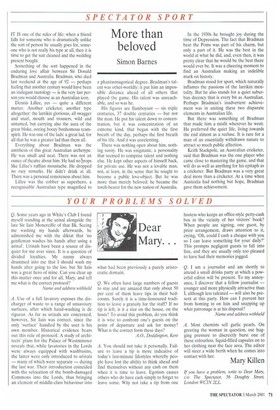More than beloved
Simon Barnes
IT IS one of the rules of life: when a friend falls for someone who is dramatically unlike the sort of person he usually goes for, someone who is not really his type at all, then it is time to get the suit cleaned and the wedding present bought.
Something of the sort happened in the enduring love affair between Sir Donald Bradman and Australia. Bradman, who died last weekend at the age of 92 — perhaps feeling that another century would have been an inelegant tautology — is the very last person you would choose as an Australian icon.
Dennis LiIlee, yes — quite a different matter. Another cricketer, another type altogether: the larrikin gloriosus, all swagger and snarl, mouth and trousers, wild and untamed, but carrying also the aura of the great bloke, oozing boozy bonhomous teamspirit. He was one of the lads: a great lad, for all that he was a greater lad than them all.
Everything about Bradman was the antithesis of this great Australian archetype. He was small and neat. There was not an ounce of theatre about him. He had no Props like Lillee's ruffian moustache. He dropped no racy remarks. He didn't drink at all. There was a personal remoteness about him.
Lillee was the cobber as superhero, a recognisable Australian type magnified to a phantasmagorical degree. Bradman's talent was other-worldly: it put him an impossible distance ahead of all others that played the game. His talent was unreachable, and so was he,
His figures are flamboyant — six triple centuries, 37 double centuries — but not the man. He put his talent down to concentration, but it was concentration of an extreme kind, that began with the first breath of the day, perhaps the first breath of his life. And it was unrelenting.
There was nothing open about him, nothing sunny. He was enigmatic, a personality that seemed to comprise talent and nothing else. He kept other aspects of himself back, for private use. He was not a lovable man, not, at least, in the sense that he sought to become a public love-object. But he was more than merely beloved: he became the torch-bearer for the new nation of Australia. In the 1930s he brought joy during the time of Depression. The fact that Bradman beat the Poms was part of his charm, but only a part of it. He was the best in the world at what he did, and, even then, it was pretty clear that he would be the best there would ever be. It was a cheering moment to find an Australian making an indelible mark on history.
Bradman stood for sport, which naturally inflames the passions of the larrikin. mentality. But he also stands for a quiet suburban decency that is every bit as Australian. Perhaps Bradman's inadvertent achievement was in uniting these two disparate elements in Australian life.
But there was something of Bradman that made him a misfit wherever he went. He preferred the quiet life, living towards the end almost as a recluse. It is rare for a man of an essentially withdrawn nature to attract so much public affection.
Keith Stackpole. an Australian cricketer, said that Bradman was the one player who came close to mastering the game, and that will do as well as anything for his epitaph as a cricketer. But Bradman was a very great deal more than a cricketer. At a time when Australia had nothing but hope, Bradman gave them achievement.












































































 Previous page
Previous page